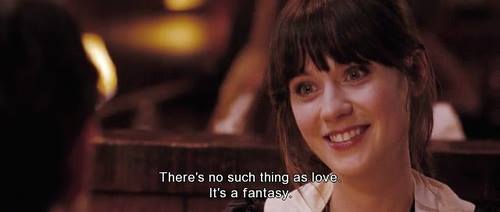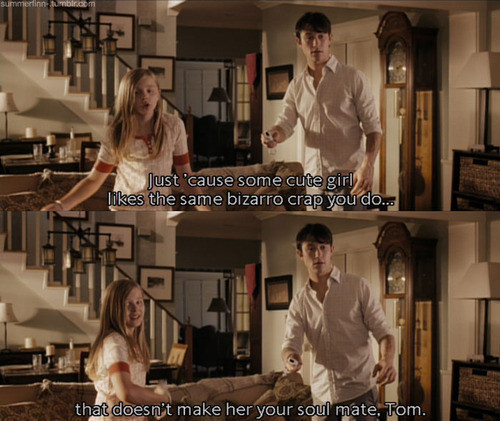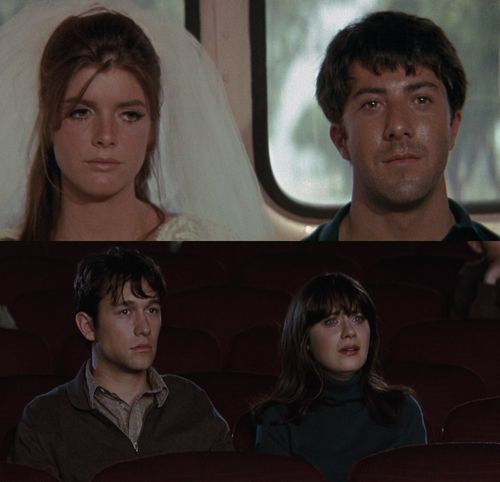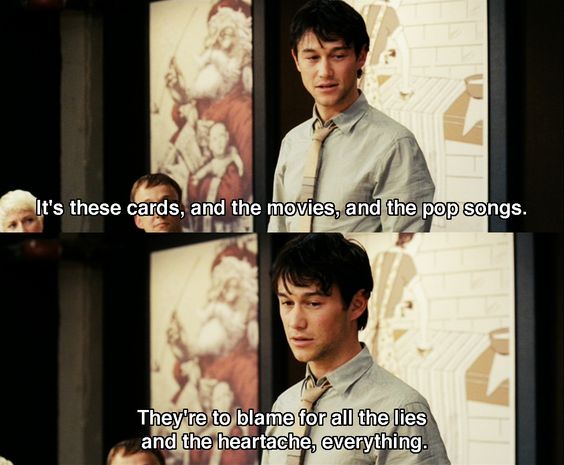
Worth Your Time? (500) Days of Summer and the consequences of the romanticization of romance
By Nicholas Cervania, February 26 2021—
(500) Days of Summer is one of my favorite films. I’ve seen it more times than I can count. It’s the first film directed by Marc Webb, who also directed the Amazing Spider-man films. If you’ve seen those movies you’d probably agree that one of their best aspects is the chemistry between Andrew Garfield and Emma Stone. Marc Webb is really good at directing people, and if you ask me, (500) Days of Summer is where that really shines.
(500) Days of Summer is a movie about Tom Hansen (Joseph Gordon-Levitt) and his relationship with Summer Finn (Zooey Deschanel). Tom studied to be an architect, but took a job writing greeting cards after it didn’t work out, and Summer is a new hire at said greeting card company. The two meet and begin a relationship.
The movie is presented in a non-linear narrative, opening with the two of them breaking up, with scenes jumping between the different stages of their relationship. This works really well since scenes of their time together are often juxtaposed directly with scenes of the time after they’ve broken up, allowing us to see how Summer’s relationship has affected Tom. However, (500) Days of Summer isn’t a love story — the narrator states this outright at the beginning. The film is a coming-of-age story cleverly disguised as a romantic comedy.
One of the most important aspects of this movie is the purposeful subversion of common tropes that are present in most romantic comedies. Tom is very much the stereotypical rom-com protagonist, he’s very hopeful and unabashed, and the movie makes it clear from the beginning that he believes finding happiness will coincide with finding, “the one.” This thought process stems from the romantic stories and music of popular culture — the romanticized idea of “true love.” As such, he almost seems to live his life as if he were in a rom-com, idealizing and overthinking every interaction he has with Summer. He ultimately suffers for it, having his heart broken when Summer decides to end things. To Tom, Summer leaving him means he has lost his only chance at happiness. In contrast, Summer doesn’t believe in love at all and she isn’t interested in pursuing it. She’s really only interested in something casual — a fling, just as her name suggests.

Summer initially comes across as a manic pixie dream girl — the bright, quirky girl in a romantic comedy whose only purpose is to magically fix all of the leading male’s problems by being with him. However, her character is actually a deconstruction of the trope. Tom sees her as his manic pixie dream girl — a perfect girl who will complete him and save him from himself. In reality however, she’s an imperfect, real person with real depth. Tom doesn’t recognize that depth and the end result for him is heartbreak. When Tom meets Summer, he puts her on a pedestal. He thinks she’s his soulmate, yet he doesn’t even know anything about her other than superficial characteristics.

His fall for her is based on her beauty, and the fact that they like the same music — but those aspects don’t add up to a perfect relationship. However, most romantic movies don’t portray this. In a typical rom-com, when two people who have common interests have their meet-cute, they fall in love and live happily ever after. This obviously isn’t what happens in real life however, and the hopeless romantic Tom is left with the grim realization that his idea of true love is wrong. His misunderstanding of the film The Graduate, which both he and Summer watch, illustrates the extreme difference in both of these characters’ perceptions of love. Summer bursts into tears, while Tom gives no emotional response whatsoever.

Tom really is the villain of his own story. Summer tells him time and time again that she isn’t interested in something serious, and yet Tom ignores her and tries to force their casual relationship into something it’s not. It’s only once he looks back on the relationship that he realizes all the signs he was ignoring and how wrong he truly was. Despite all his mistakes however, I don’t want to come off as completely unsympathetic towards Tom. I do think Summer isn’t entirely innocent, as she does arguably take advantage of Tom’s idealization of her.
After spending some time apart, Tom and Summer happen to run into each other again at a mutual friend’s wedding and begin to reconnect. She dances with him and invites him to a party she’s hosting. Still thinking his life to be a rom-com, Tom attends this party with expectations that they will rekindle their relationship. He then finds out the crushing reality that Summer is engaged, and his world collapses in one of my favorite shots of the movie.
What I love about this plot point is that you don’t ever actually see Summer’s husband — he doesn’t matter. What does matter is how it motivates Tom to reject his preconceived notions on the idea of true love and reevaluate everything that’s happened so far.

He quits his job at the greeting card company and we get a great montage of Tom studying, sketching and interviewing for his way back to a career as an architect — it’s one of my favorite scenes in the movie. Marc Webb began his career directing music videos, so his montage scenes are usually pretty good. Tom gets rejected for job after job, but he never gives up. Wordlessly, he goes through this process and comes to the realization that finding your soulmate is not the key to happiness, and that true happiness comes from within.
In the end, Tom learns that it was wrong of him to put Summer on a pedestal, and that destiny, soulmates and true love don’t really exist. But, another chance encounter with Summer gives him closure and we find the dynamic between them has shifted. Now, Tom is the one who doesn’t believe in love and Summer is the hopeful optimist who does. She tells him that he was right in believing in the existence of love, just not right about being in love with her. So, when he meets a new girl — aptly named Autumn — in the final scene of the movie, we see how he’s matured and how he doesn’t think their encounter to be fate or them to be soulmates in the way he did with Summer.
Despite this, he asks her out anyway, because while destiny and true love might not exist, that’s no reason to entirely give up hope.
I really like this movie, and I think it has a lot to say about relationships and the consequences that come with the way modern media glamorizes stories of love. I love the soundtrack, the shots and the chemistry between the leads. I also love the way the color blue is used to represent Summer, having scenes of them together filled with it and scenes of them apart being muted and brown. I really love that Tom and Summer don’t get together in the end, because it emphasizes how much he’s grown over the past year and a half. A lot of films romanticize the idea of love, but this film really takes those ideas and presents them pragmatically. Life may not be a perfect and glamorous rom-com love story, but that doesn’t mean that it isn’t worth living. Whether you’ve just gotten out of a relationship, just got into one or have been spending time finding happiness from within, (500) Days of Summer has something you can relate to.
